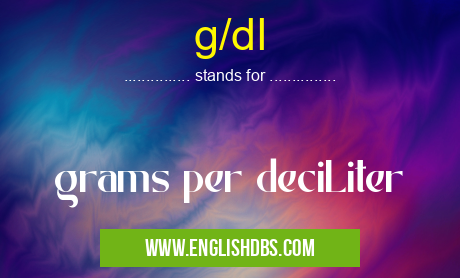What does G/DL mean in CHEMISTRY
Hemoglobin (Hb) is a protein in red blood cells that transports oxygen from the lungs to the rest of the body. Hb concentration is usually expressed in grams per deciLiter or g/dl. This abbreviation helps quickly determine a person's hemoglobin level, which is important for diagnosing and monitoring a variety of health conditions.

g/dl meaning in Chemistry in Academic & Science
g/dl mostly used in an acronym Chemistry in Category Academic & Science that means grams per deciLiter
Shorthand: g/dl,
Full Form: grams per deciLiter
For more information of "grams per deciLiter", see the section below.
Essential Questions and Answers on grams per deciLiter in "SCIENCE»CHEMISTRY"
What does Hb stand for?
Hb stands for hemoglobin.
Why is hemoglobin important?
Hemoglobin is important because it carries oxygen through the blood to all parts of the body. Low levels of hemoglobin can lead to anemia, which can cause fatigue and other health issues.
How is hemoglobin measured?
Hemoglobin is most often measured in terms of its concentration, which is typically expressed as grams per deciLiter (g/dl).
What do low levels of hemoglobin indicate?
Low levels of hemoglobin may indicate that a person has anemia or another health condition that affects their red blood cell count or ability to carry oxygen throughout their body.
What are some ways to increase hemoglobin levels?
Some ways to increase hemoglobin levels include taking iron supplements, eating foods rich in iron like leafy green vegetables and legumes, and exercising regularly.
Final Words:
Measuring Hb concentration in g/dl provides valuable information about a person's overall health and wellbeing. It can also help diagnose and monitor medical conditions related to low blood cell counts or poor oxygen delivery throughout the body.
